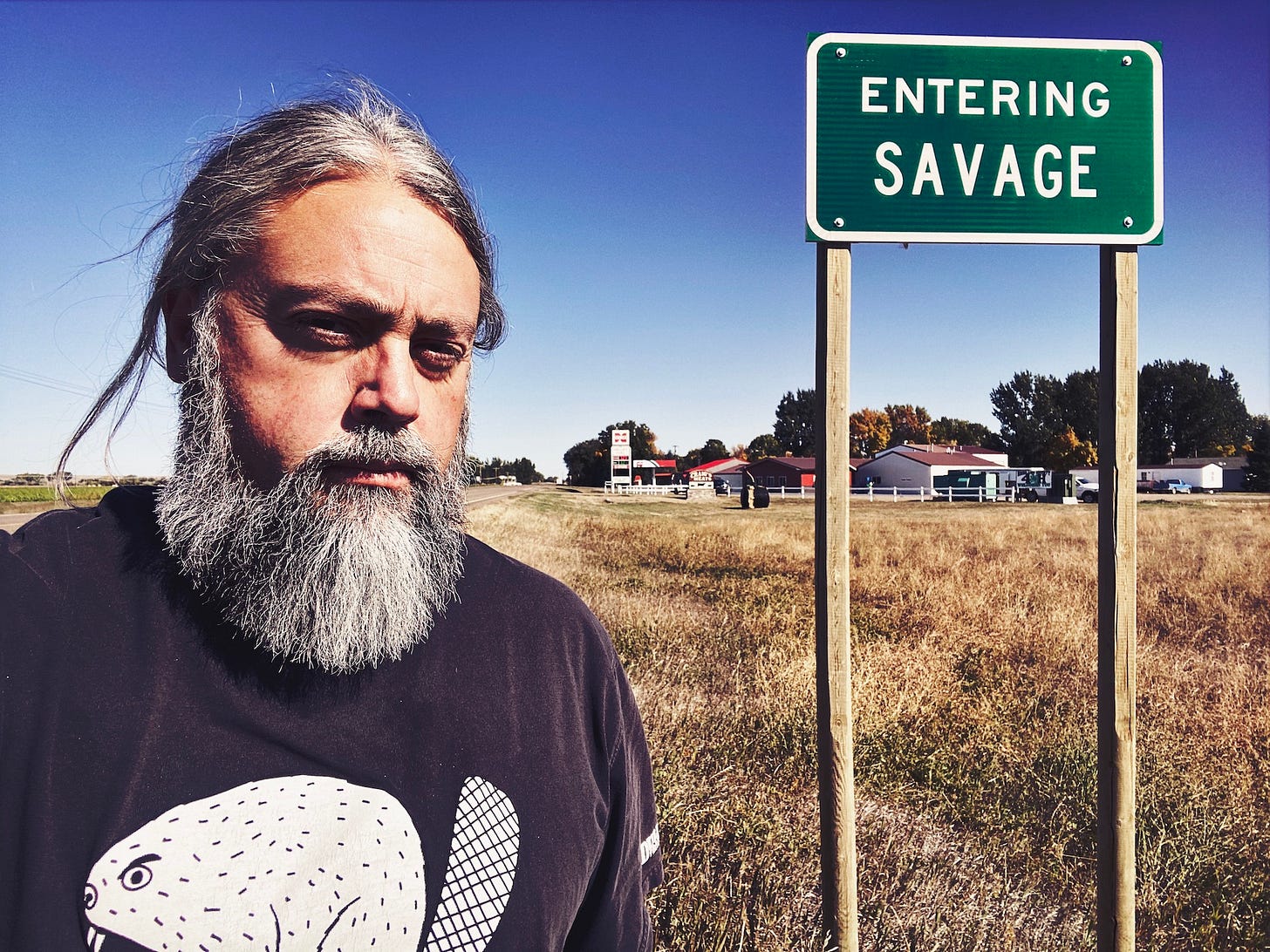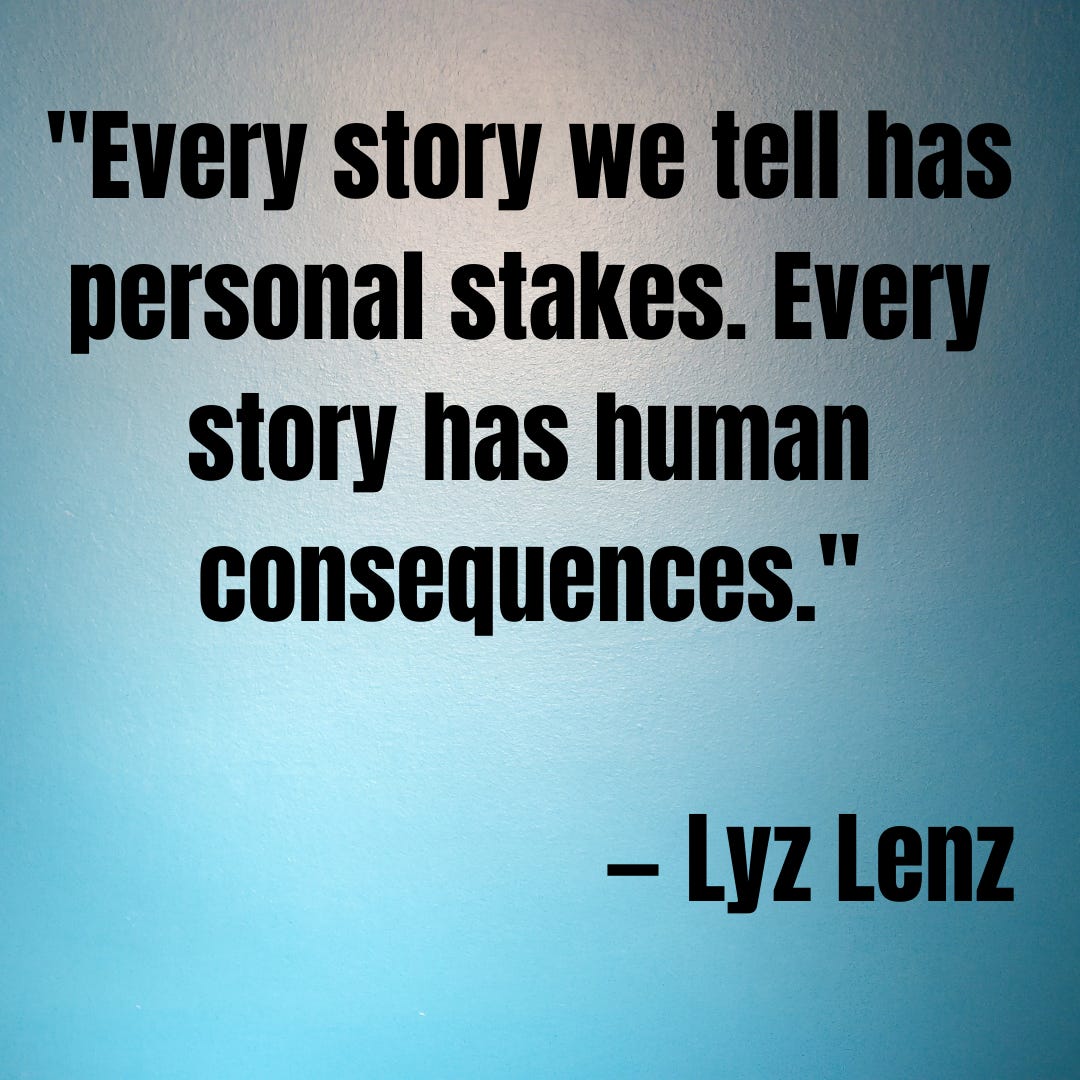Weighing Fake Things
With real things
The poet Freya Rohn keeps a wonderful newsletter called, The Ariadne Archive. Recently, in a thoughtful piece titled, "On the Confession of Witches," she writes:
My mom is deep into genealogical research most days. It’s not unusual to get texts from her with some new ancestor story. Most of the time I brush these off—everyone is related to everyone when you go back far enough.
That line struck a nerve with me. When I first launched myself however many years ago into learning about the Little Shell Tribe, and the Métis, if you'd asked me then why I was doing it I might have said something about wanting to know who my family is. I grew up with essentially zero contact with anyone from my dad's side of the family, and coming to terms with that was certainly a significant part of my interest.1
Yet despite the thrill I enjoyed in researching a family tree in order to determine whether or not I could be enrolled, and then getting enrolled, I quickly lost interest in the details. I know pretty well the direct line as far back as just three or four generations removed, but I don't know all the branches from there; aunts, uncles, cousins, etc. I'm content knowing that all of us La Trays and Doneys in Montana are related to varying degrees, and from there with just about everyone else in the tribe, and that is good enough. For me, the story almost immediately grew beyond these relationships of kin.
In her “Witches” piece, Rohn draws a connection between the confessions of women accused of being witches and the confessions of women culturally, particularly as it relates to women who write “confessional” poetry and Rohn's own exploration of such, and what it reveals to herself. She writes:
It is poetry that encourages looking outward rather than solely inward. It [confessional poetry] demands an audience—to be read, to be acknowledged, to bear witness. Their work is not only about the self, it’s about society—that is what these poems proclaim so loudly. These are not poems of one woman; these are poems that point to the experience of all women.
This describes perfectly the relationship I have to the story I am chasing; it’s largely memoir, and memoir certainly falls—or can fall—into that realm deemed “confessional.” The larger story is of all the people who have shared the disconnect that my family has suffered, who we are, how we came to be where we are, and what we are doing to make ourselves known. As a self-proclaimed storyteller, this outward-looking big picture story is the one I want to illuminate. The personal story of my little branch of the La Tray tree certainly helps to humanize it a little bit, I think, but it is just a small piece of it. It's more about how our people have been engaged with the world, and how the world engaged back. It is history, and good history is revealed through good stories, whether people, some people, want to hear them or not. History is always happening, and this particular history I’m writing about is as alive as it ever was.
Another newsletter I've recently subscribed to is called Men Yell At Me by the writer/journalist Lyz Lenz. It's another fantastic one. Recently, she wrote a piece called, “There Have to Be More Sides Than This.” It deals largely with “both-siderism,” an issue in journalism where journalists give equal play to “both sides” of an issue, even when there is really only one viable side to the story. As an example, she talks about Charlottesville, VA, where: “In 2017, white supremacists held multiple rallies across three months, in a hazy summer of hate that culminated in the death of counterprotester Heather Heyer, when James Fields hit her with his car.”
Lenz writes about how journalists covering the trials resulting from these events of four years ago have faced push-back from local anti-racist activists who won't talk to members of the press who want to address “both sides” of the issue, because there aren't two sides. Violent hate doesn’t deserve to be, nor should be, heard. Lenz quotes Mimi Arbeit, a community member, PhD, and activist, on the issue: “It’s a deep betrayal to the entire community of Charlottesville. Fascism uses the press to normalize itself and recruit followers and gain social power. The press is not a neutral player in history.”
You've probably seen THIS CLIP of the old white guy in Virginia being interviewed before last week's election, talking about Critical Race Theory as being THE issue, even though he doesn't exactly know what it even is. There's a reason for that. Lyz Lenz writes:
Extremists use the polite conventions of journalism to make issues that are not issues. Journalists covering school board elections this year were bombarded with candidates making claims about “Critical Race Theory”—a complicated concept that is definitely not taught in elementary school, but became a talking point, in part because if you show up at a school board as a sobbing white mom, you will get a news story out of it. The story leads with the tears. Then balances with the other side and then ends with the tears again. And it’s published.
Another great Lenz quote:
By weighing the fake thing (CRT) in balance with the real thing (that it doesn’t exist in schools), the fake thing becomes real by comparison. The imagined threat is now called out of the looming darkness and made manifest into life.
CRT has raised its head in Montana too where, just like everywhere else, it isn't taught in any elementary schools or high schools. Montana State Superintendent of Public Instruction Elsie Arntzen was just down the road from me at an abomination of a “church” called Crosspoint Community Church earlier this week giving a talk on “parental rights.” She mentioned CRT as something that is, “coming down the pipeline.” Writing for the Daily Montanan, Keila Szpaller reports:
In her talk, she [Arntzen] raised the subject of critical race theory and said given the challenges to monuments around the country, as well as challenges to Montana and American history, she had talked with Attorney General Austin Knudsen about critical race theory after the Montana Legislature ended. Knudsen came out with an opinion, and she shared her expectation at the meeting.
“You can teach critical race theory. But you have to teach the other side too. You can’t be biased when you teach,” Arntzen said.
I originally intended to go to that meeting at Crosspoint, which was open to the public, just to check it out. I wanted to ask Arntzen if she'd ever heard of the 1863 Treaty of Old Crossing, which despite happening in Minnesota has reverberated across time to effect thousands of residents of Montana. Or the Cree Deportation Act of 1896, which did happen in Montana with similar results. These are just two instances of history that are tied into the story I am telling because no one else really is, nor is the story being encouraged to be told by the likes of racist extremists like Elsie Arntzen and Austin Knudsen. In fact it's the opposite: people like these soulless shitheels are challenging school boards and school libraries all across the country in an effort to change stories and whitewash history. It is a horror show of ignorance and too many people fall for it.
I didn't go to the meeting. Ultimately I realized the anger I would feel in the aftermath probably wasn't worth it, and nothing I might have opportunity to say in that arena would be heard anyway. The hate-filled people there, for all their self-identifying as “Christians,” don't know the first thing about love and community and they aren't worth my time. I'm grateful for the reporters who attended, and I'm grateful for the uproar around it in the Missoula community and elsewhere around the state. We face a long uphill battle against ignorance and hate in this state and I'm not sure if we are up for the task. We need more strong reporters, people of courage willing to call bullshit on the people using them to further their hateful and ignorant rhetoric.
“Words carry weight,” Lyz Lenz says. “What is allowed to remain unsaid in a story is just as powerful as what is said. In fact, it’s more powerful, because what’s worse than being denied on the page is being ignored. It’s being erased from a narrative that refuses to see you. That refuses to see the violence done to you.”
People need to commit to a world that doesn't erase other people. I'm not sure there are enough folks in my community willing to do that, to challenge the foundations of a world bent almost exclusively for their (white-skinned) benefit. Biden gets elected and people relax. Our mayor, who never saw a cop whose leg he didn't want to hump, gets re-elected and people relax. They roll their eyes at the folks who keep pushing. It is lonely and frustrating.
“In America, in their everyday life, most white people don’t have to answer questions about whether they sympathize with white supremacists,” Lenz also writes. “Charlottesville did. Your town wouldn’t survive that unscathed, either. Trust me.”
Freya Rohn gets the last word here from her witch confession piece:
Women have been told for centuries that their stories—their madness, their despair, their depression, their poverty, their anger—are something that they need to confess to or learn to fix.
Same goes for my Little Shell family, and for all Indian people. We are supposed to “get over it,” because we “lost.” We are supposed to shut up and assimilate. I say fuck that. The days of erasing us are over. The days of silence are over.
And what about my mom's people, all of European origin? I struggle with this question myself. This quote from Suzanne Methot, Asiniwachi Nehiyaw (Rocky Mountain Cree), captures my feelings perfectly. She writes, "I am just as Scottish as I am Nehiyaw, and being of mixed ancestry gives me precious insider insight into more than one world—but I choose to reanimate the Indigenous narrative so that I can find the missing parts of myself."



The challenge of writing memoir that honors the personal story while *also* turning it outward is the struggle I've been waging with my book (that and having to live through it enough to have some perspective). How does this personal thing that happened, the cultural forces that got us into that cul-de-sac, and the actions I took to get out, open a space where we can explore what it means to live in this world, what it might mean to live differently in this world?
Yes to all of this. Both side-ism is, I think, largely about keeping the status quo and avoiding “uncomfortable” conversations—though, of course if you look at which conversations people call “both sides!” on, and whose comfort they’re concerned for, it’s pretty clear they long ago chose a side for themselves and it’s admitting it to themselves and others that they’re working to avoid.
Thank you as always for your words, Chris. I look forward to them every Sunday.